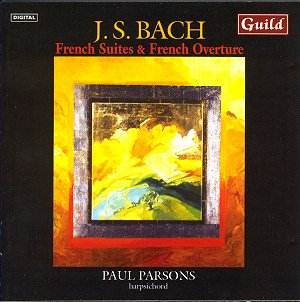Bach's French Suites are among his most popular
works for keyboard, with their attractive melodic material and
relative ease of playing compared with some of his other works.
As Derek Adlam says in his liner notes: "Each suite has a specific
quality and character derived from the ‘colour’ of the key chosen:
the first in D-minor is serious and dignified, cantabile lines
are emphasised in the second in C-minor. The use of B-minor for
the third suite gives Bach an opportunity for writing in a style
that is deeply felt and abstracted at one and the same time, a
manner which he often associated with this key. The three remaining
suites in major keys similarly explore the affekts of key colour.
In the mellifluous key of E-flat, the melodic lines of the Allemande
soar and fall through an unusually wide compass. When writing
in G-major Bach comes closest to the airy grace of true dance
music. With the addition of a sixth suite in the bright key of
E-major, there is a sense of a brilliant culmination of the whole
set."
This set includes the French Suites and the French
Overture, as well as a Prelude and Fugue in A minor. This is a
strange set. There is little in common between the French Suites
and the French Overture other than their names. The French Overture
is closer to Bach's partitas in style, and is indeed one of the
largest keyboard works of his, with a huge opening prelude (over
12 minutes here), which is itself called an overture. Unfortunately,
Parsons seems to rush through this great work, with tempi that
are beyond what one might call "lively". Especially during the
repeats, I had to wonder whether he was trying to get through
them as quickly as possible. He offers little variety in his playing
of the repeats, making them sound just like copies of the initial
parts.
Parsons' playing changes when he begins the first
French Suite. He sounds more in touch with the music, less hurried,
and his phrasing is rounder. But his tempi are still on the fast
side, and I can't help but feeling, even as he ends one section
and begins another, that he shaves off a couple of beats to get
to the end more quickly. At times he plays certain movements in
a straightforward manner and in others he ornaments them excessively,
trying to make them echo Couperin. He is more successful with
some of the slower movements, such as the Sarabande of the C minor
suite, where the tempo is more appropriate, but at this slower
speed he seems almost unconvinced in the music he is playing.
The Ruckers copy used for this recording produces
a luscious sound, but at times there are some strange clicking
sounds (around 10:43 in the opening movement of the French Overture,
for example). This harpsichord has an attractive range, with a
smooth-sounding high end, but a bit of weakness in the low end.
There is little to recommend in this recording,
especially with so many other fine discs of the French Suites
and French Overture. Parsons gives little impression of having
a plan in playing these works, unless his fast tempi and often
exaggerated ornamentation are meant to give them character. Unfortunately
these attributes detract from the musicality of the suites, resulting
in a disappointing recording. The listener looking for a good
recording of the French Suites on harpsichord would do better
with Davitt Moroney's recording on Virgin or Blandine Rannou's
recent set on Zig-Zag Territoires.
Kirk McElhearn
